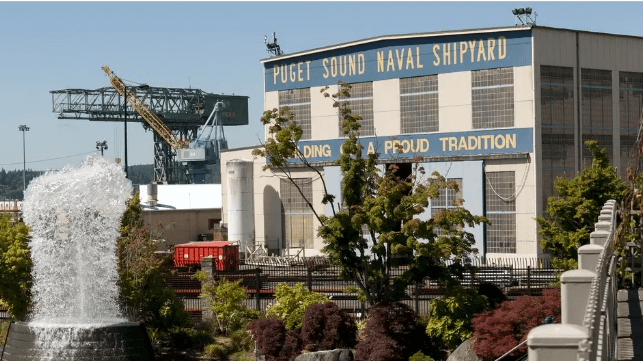U.S. Navy Releases Plans to Upgrade Puget Sound Naval Shipyard

The U.S. Navy has released plans to completely overhaul the aging Puget Sound Naval Shipyard in Washington, which lacks the capacity to accommodate new classes of vessels like the Ford-class aircraft carrier or the Columbia-class submarine.
Four years after it unveiled its two-decade Shipyard Infrastructure Optimization Plan (SIOP), the U.S Navy has embarked on the modernization of Puget Shipyard. The Navy has announced a proposal for the shipyard’s modernization program, which will include a new multi-mission dry dock designed and built to serve for the maintenance of modern warships and submarines.
This will require a major program of modification, demolition, and replacement of piers, wharves, buildings, cranes and utilities to make the space for the new dry dock. The project will also involve dredging to create turning basins, entrance channels and adequate water depth at wharves and piers.
In addition, it will involve upgrading the existing Dry Dock 6 to meet current seismic standards. The dock is critical because it is the only dry dock on the West Coast that can accommodate a nuclear-powered aircraft carrier.
The Navy has started the process of preparing an Environmental Impact Statement (EIS) to evaluate the potential impacts of constructing the new dry dock and associated waterfront infrastructure. It has also initiated a 30-day scoping period to accept public comments on the project's potential impact on historic properties.

that matters most
Get the latest maritime news delivered to your inbox daily.
A historic landmark at the Puget Shipyard has been earmarked for demolition: the iconic green hammerhead crane, which has been a towering symbol of the shipyard for nine decades. The 25-story crane was built and installed in 1933, but the Navy says that it has degraded after a quarter century of disuse and would be costly to maintain in a safe condition.
Constructed in 1891, Puget Shipyard is the largest of the Navy’s four public shipyards and has a workforce of 15,000. Much of its infrastructure dates back to the late 1800s and early 1900s, and it was designed for building and maintaining ship classes that are no longer part of the fleet. Other than construction of Dry Dock 6 in the early 1960s, the shipyard has had few major infrastructure updates, and its dated layout and equipment are part of the problem behind the maintenance delays that have plagued the Navy in recent years.
